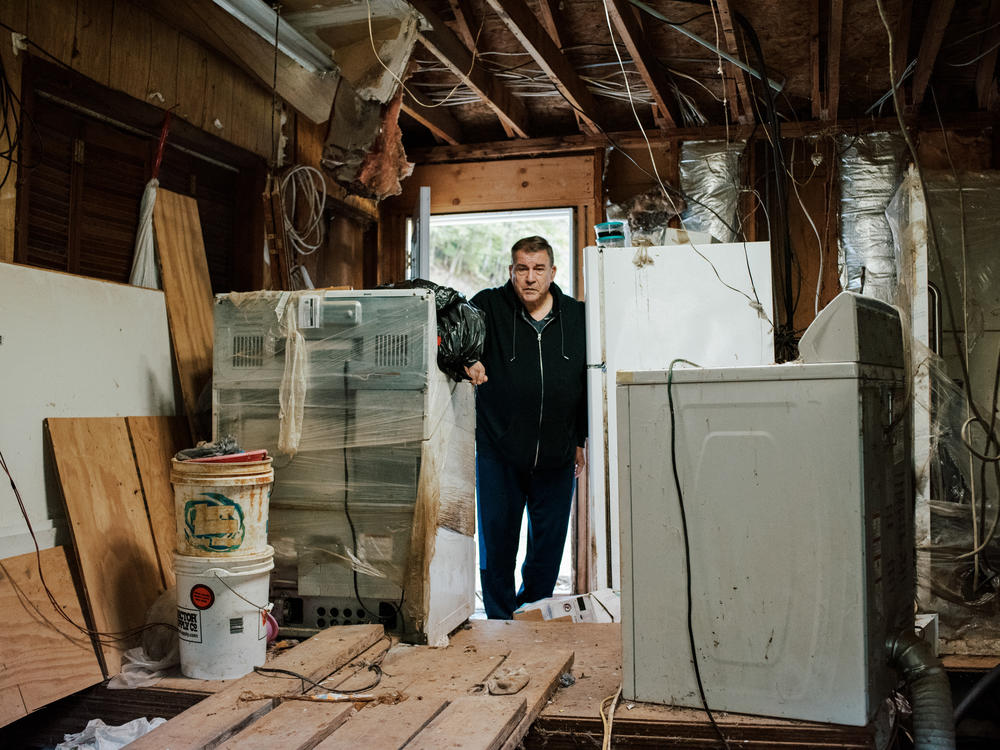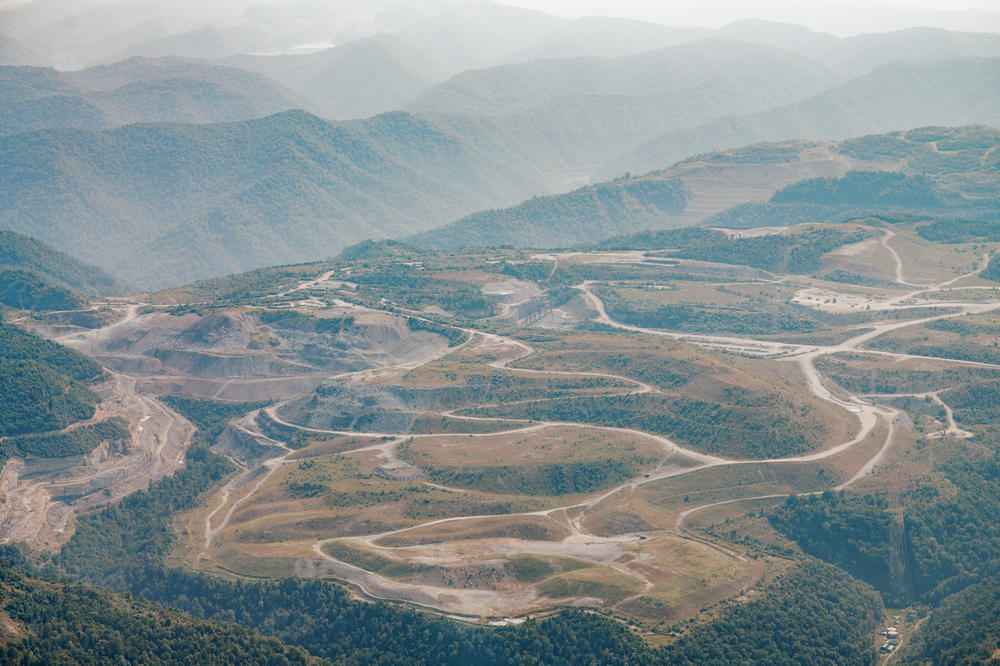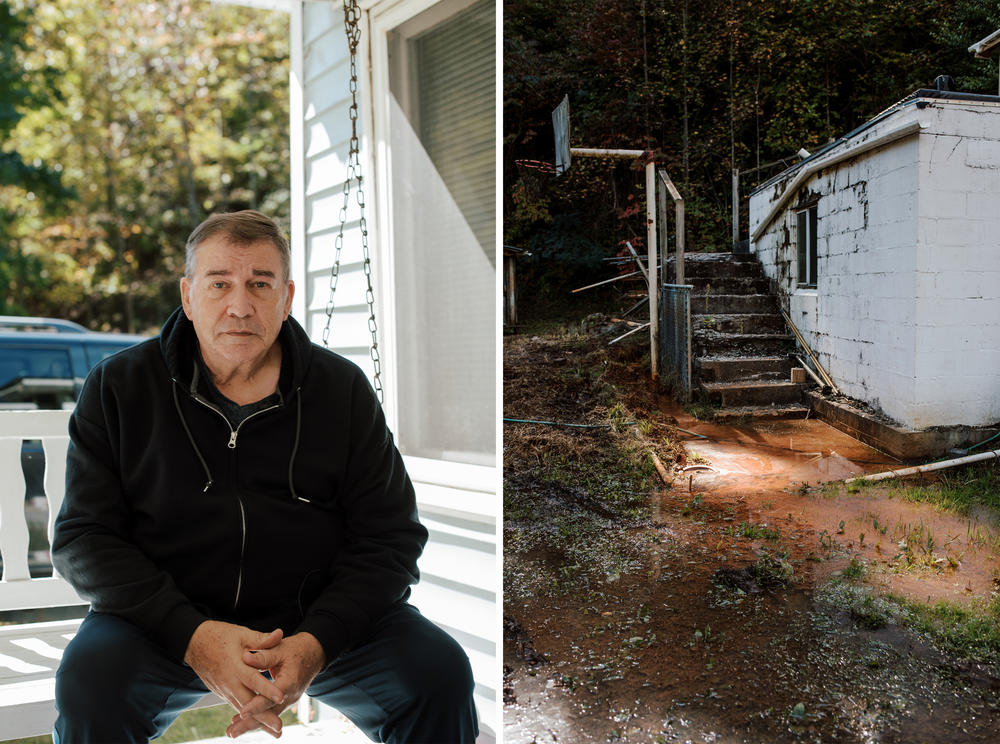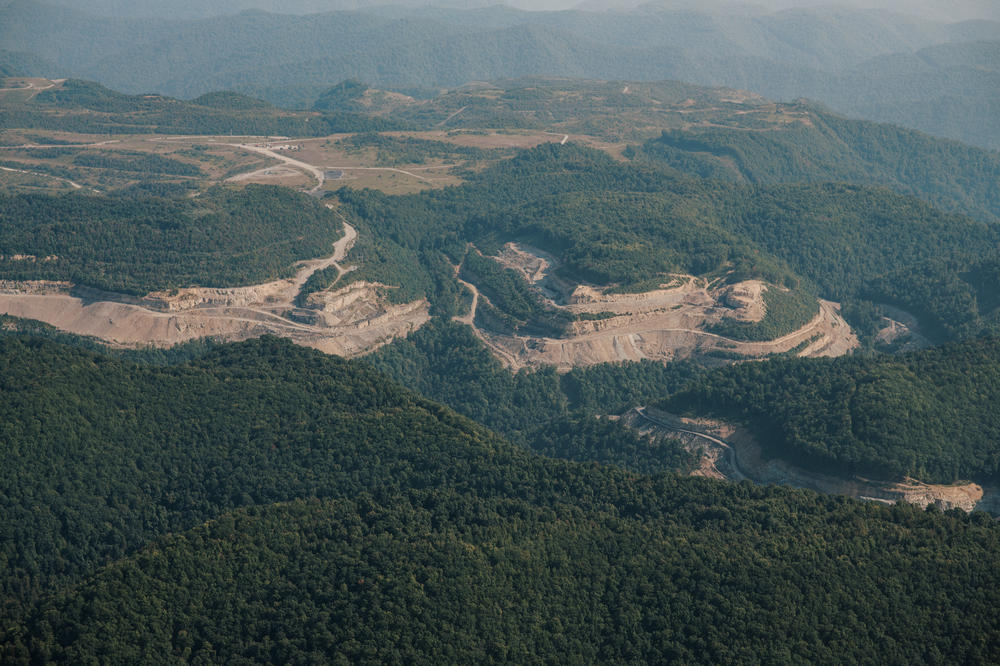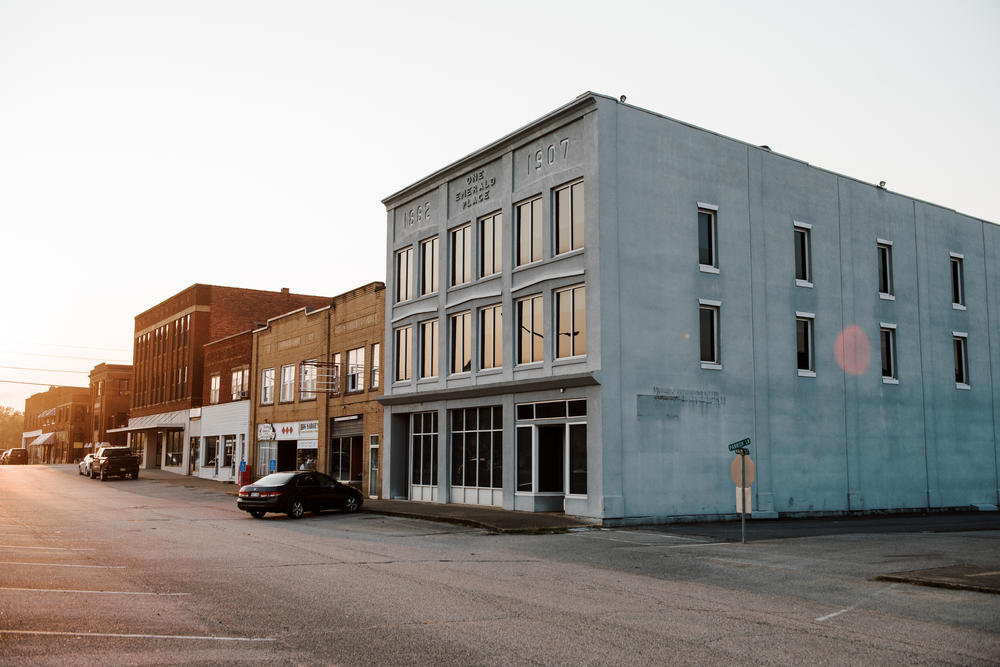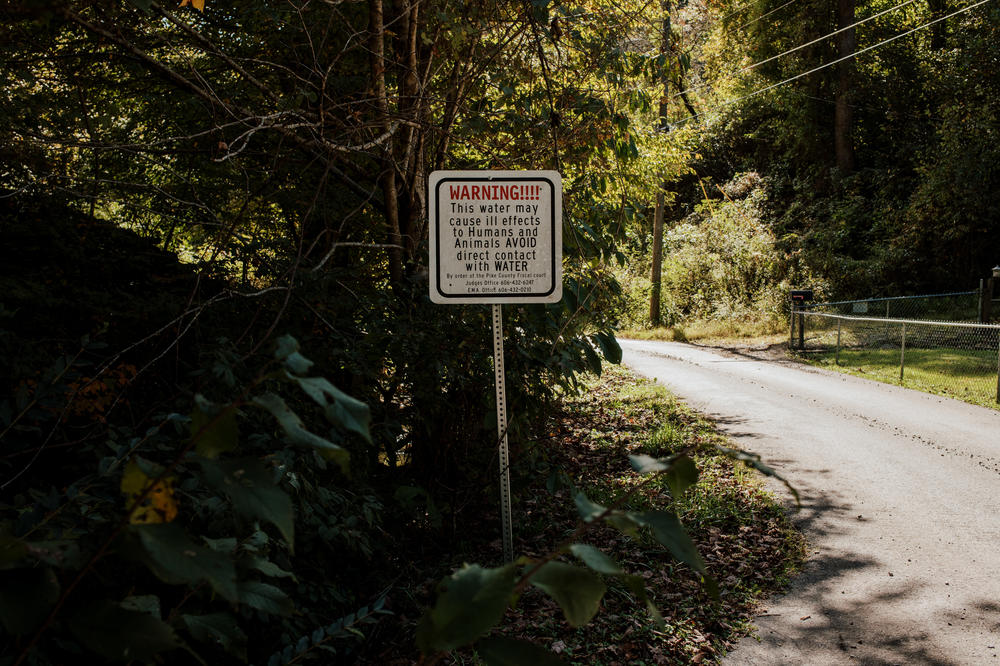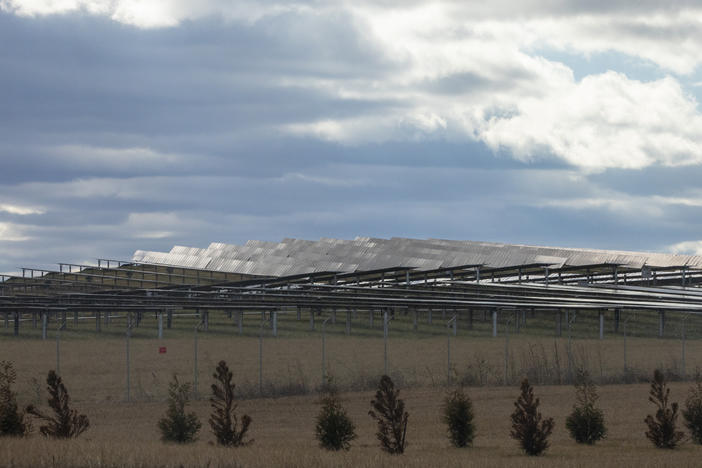Loading...
Section Branding
Header Content
How big coal companies avoid cleaning up their messes
Primary Content
Miles Hatfield was walking into his dining room when he felt the wooden floor give way. His legs dropped hip-deep into water that had pooled under the brick house in the green hills of eastern Kentucky where he had lived for the past 40 years, trapping him in his own floor.
Hatfield, a retired coal miner, raised two boys in the house a few miles from the West Virginia border and added on five rooms as his family grew. But the red water running off from the nearby Love Branch coal mine had turned his backyard into a marsh, ruined his septic system, and finally sucked him through his floor three years ago.
Love Branch used to be owned by one of the biggest coal companies in the U.S. Federal law requires companies to clean up the land when they finish mining — and Love Branch hasn't produced any coal in more than a decade. But the former owner, now named Alpha Metallurgical Resources Inc., transferred the mine and its cleanup obligations to a smaller company in 2018, the year before Hatfield fell through his floor.
"They pretty well destroyed me up there," says Hatfield, 70, who had to move to a rental nearby. "Everything for me is gone."
Kentucky regulators have said that Love Branch caused the flooding of Hatfield's home and those of his neighbors above Deer Lick Road. But Alpha isn't responsible because it transferred the mine's permit to another company called Lexington Coal. Mining permits apply to a specific patch of land and can be transferred from one company to another with the approval of state regulators.
Alpha has transferred more than 300 mining permits to smaller companies since 2015, when an industrywide downturn pushed it and other big coal companies into bankruptcy. By shedding those permits, more than it currently holds, the company also freed itself from the responsibility to clean up the mines. Those old Alpha permits are now owned by smaller companies like Lexington, many of them in precarious financial shape. The smaller companies have drawn pollution lawsuits, environmental violations and complaints from distraught homeowners like Hatfield.
While coal's devastating contribution to climate change has been well documented, it has also left a long and painful legacy in communities where it's mined. A joint investigation by Bloomberg News and NPR found that Alpha is one of several large U.S. coal companies that used the same playbook. They transferred old mines in need of cleanup to smaller operators with meager financial resources, raising the risk that taxpayers, rather than industry, will eventually be stuck with the cost.
And the very weakness of these new owners limits regulators' powers. Anything officials might do to enforce environmental laws — from issuing fines, halting coal production or revoking permits — hampers the new owners and could result in even less money to restore blighted landscapes.
The cleanup obligations held by just three of these new owners in multiple states amounts to more than $800 million, according to a Bloomberg News analysis based on mine-permit data and per-acre reclamation costs contained in a West Virginia legislative audit.
To guarantee their obligations, these companies — Lexington, Blackjewel LLC and ERP Environmental Fund Inc. — have posted bonds of less than half that amount, leaving a potential shortfall of about $480 million, the analysis shows. Blackjewel filed for bankruptcy in 2019 and is currently in liquidation, and ERP has been in court-supervised receivership since 2020.
Coal companies that filed for bankruptcy have offloaded about $17 billion in miner pension and retiree health care costs that is now mostly the responsibility of the federal government, according to a United Mine Workers of America estimate. Many of these companies are now posting record profits thanks to a surging coal market.
Alpha said in a statement that it is proud of its environmental record and that its transactions were part of a transition from thermal coal, which is burned to make electricity, to metallurgical coal used to produce steel. "These transactions are subject to significant oversight, requiring the review and approval of a number of government regulators," the company said. "In many cases, Alpha has included funding within such transactions for reclamation and other liabilities."
Lexington said it would respond to questions from Bloomberg but didn't.
For people who live near those idled mines, the flooding, the polluted streams and the damaged homes can be overwhelming.
Hatfield has moved to a new home, and he says he hates writing rent checks after working decades to pay off the mortgage on his old house by the Love Branch mine. He says Lexington paid him $1,500 for the right to drive onto his land about two years ago and bury a pipe that's supposed to redirect all the water, but it hasn't helped. And he's not holding out hope that an Alpha or Lexington executive will offer to pay for a new floor. "I'd tell him I'd greatly appreciate it if they'd make things right," Hatfield says. "He'd probably laugh at me because he knows he'll get away with it."
Coal has left behind a complicated legacy
Regulators fined Lexington $30,000 in June for failing to clean up the Love Branch mine and stop the flooding. Lexington said in a July filing that it doesn't admit responsibility for any damage and that it needs more time to finish reclamation, which under federal law requires returning the land to its original shape, planting native vegetation and preventing future flooding or toxic runoff.
Coal is inextricably tied to the story of how the U.S. became a superpower. It was used to forge weapons used in the American Revolution. Over the next two centuries, as coal producers extracted the energy that powered the nation, they also destroyed millions of acres of productive land. Mining left behind more than 50,000 underground mine openings, and it polluted tens of thousands of miles of rivers and streams. But there were no federal rules requiring coal companies to mitigate the damage.
In 1977, Congress passed the Surface Mining Control and Reclamation Act (SMCRA), creating federal minimum cleanup standards and a bonding system to help cover the costs if companies walked away from their obligations. From that point on, coal companies were supposed to restore land as they mined.
Joe Pizarchik, who ran the Office of Surface Mining Reclamation and Enforcement during the Obama administration, says the law eliminated almost 50,000 underground mine openings and more than 1,000 miles of dangerous cliffs left behind by coal mining.
But as coal companies began struggling to compete with cheaper natural gas more than a decade ago, they started offloading their cleanup obligations. Alpha would follow that same strategy.
How asset transfers and bankruptcy worked to coal's advantage
Alpha was the creation of private equity. First Reserve Corp., a Connecticut-based leveraged buyout pioneer in the energy industry, bought three coal companies in 2002. By 2006 it had taken Alpha public and sold its ownership stake. But over the next five years Alpha kept buying up other companies, culminating in its purchase of Massey Energy Co., the biggest coal company in central Appalachia. Massey had been shaken by a 2010 explosion that killed 29 people, the worst U.S. coal mining disaster in 40 years. Alpha paid $7 billion for Massey less than a year later.
Abundant natural gas brought online through hydraulic fracturing dealt the coal industry a tremendous blow. By early 2015, the amount of U.S. electricity produced by gas overtook coal for the first time. One by one, the giants began to fall. Patriot Coal Corp. filed for bankruptcy in May 2015. Alpha filed that August, and Arch Coal Inc. followed in January 2016. Then bankruptcy came for the biggest private-sector coal company in the world, Peabody Energy Corp., whose record of environmental damage was memorialized by singer-songwriter John Prine.
Arch and Peabody didn't respond to requests for comment.
The corporate reorganizations saved the industry — in part by shifting liabilities to taxpayers. Josh Macey co-wrote the Stanford Law Review article "Bankruptcy as Bailout," which described how the four coal companies used the federal bankruptcy system to shed billions of dollars of environmental and labor obligations.
U.S. bankruptcy law aims to get foundering companies back on their feet by canceling debts they have no hope of paying. But critics like Macey, now a law professor at the University of Chicago, say the code is ill-equipped to deal with obligations imposed by labor or environmental laws. These can get short shrift in bankruptcy, he wrote in the article, allowing companies to essentially use the courts to invalidate regulations they don't want to follow.
When coal companies shift their old mines to shaky owners, he went on to say, those transactions should be viewed as fraudulent transfers — the technical term for moving assets in order to stiff creditors.
"This is a slight exaggeration," Macey says in an interview, "but it's like they say, 'I'm going to give all these liabilities to my destitute neighbor.' You can't imagine that cleanup will actually happen."
Alpha also shed in its bankruptcy about $2.2 billion in pension obligations and health care costs, according to a United Mine Workers of America estimate, plus another $494 million in black lung benefits, according to the U.S. Government Accountability Office.
If coal companies abandon their black lung obligations, the federal government picks up most of the bill. The U.S. government also covers most of the unpaid pension liabilities and other health care benefits promised to miners. A bill introduced by West Virginia Democratic Sen. Joe Manchin and passed in 2019 lifted the amount of taxpayer funds that can go toward those payments to $750 million a year.
But even after shedding more than $2 billion in labor obligations, Alpha still had a problem: State and federal regulators objected to a plan for its lenders to take ownership of the company's productive mines while leaving hefty reclamation costs in a separate company. "Alpha cannot simply walk away from those obligations," the West Virginia Department of Environmental Protection said in objecting to the plan.
Alpha settled the objections by agreeing to set aside more than $300 million for reclamation so it could exit bankruptcy and resume operations. But not long after that, Alpha made another announcement.
Rather than do the cleanup work itself, it handed off idle mines and more than $300 million to Lexington, a much smaller company with little exploitable coal. Instead of an open-ended commitment to pay whatever was required, Alpha's obligations were now capped. Alpha's CEO said the deal would accelerate the cleanup. His counterpart at Lexington spoke in a statement of a "five-year timetable" for reclamation.
Five years have passed, and signs of progress are scarce. Of the 232 permits Alpha transferred to Lexington, only 41 have been fully cleaned up, state records show. By another measure, Lexington is doing even worse: Of the $190 million of bonds that regulators required it to post to guarantee reclamation, they have authorized the release of just $24 million, or about 13%, according to state data compiled by Bloomberg and by Appalachian Voices, an environmental advocacy organization.
Amid all the damage, few signs of cleanup
Junior Walk sees that unfinished work every day.
The 32-year-old environmental activist with Coal River Mountain Watch spends his days driving an old Subaru along back roads in West Virginia and flying drones to peer down on the gray moonscapes created by coal mining. With a black Glock strapped to his hip, he patrols thousands of acres once mined by Alpha. His reports have prompted unannounced inspections and kept regulators focused on reclamation issues.
Walk came by his distrust for coal companies early while growing up in Raleigh County: He says he couldn't drink the water in his own home as a teen because of mine runoff, and he isn't hopeful that Alpha or any other company will step up now.
"These billion-dollar corporations are going to do whatever they want to do because they own the state," he said one day in July, as branches slapped the dirty windshield of his car bumping up a steep dirt road in southern West Virginia. "And what they want to do is whatever's cheapest for them and worst for us."
Near the top of the mountain, he pulled the car off the road, eyed the grass for rattlers, then snapped the propellers onto his drone. It rose with a loud buzz and was soon far above us, looking toward the Twilight complex across the valley, a collection of surface mines now owned by Lexington with a circumference of more than a dozen miles.
Lexington is actively mining coal at Twilight and has racked up more than 20 violations there, including dumping so much dirt into a stream that muddy water could be seen from "bank to bank" 7 miles downstream. The nearby Crescent mine, which Lexington also took over from Alpha, has been the subject of more than 30 environmental violations and about $50,000 in fines for failing to control runoff and letting boulders roll downhill to damage trees.
The company was issued 53 state and federal violations this year through mid-June, more than all but one other miner in the U.S., a federal database shows. That's up from 31 in the same period last year.
The situation has gotten so bad that West Virginia regulators took the extreme step of suspending Lexington's Crescent permit in early September. And the federal judge overseeing a lawsuit accusing Lexington of polluting streams and rivers at two other mines told the company he was "losing patience" with its lack of progress and imposed a $1,500 per day fine.
Regulators in West Virginia and Kentucky defended their decisions to allow Alpha to shift its cleanup obligations to Lexington, pointing out that they have limited powers to block transfers if applicants meet basic requirements. The Kentucky Energy and Environment Cabinet noted that the transfer took place amid a "severely depressed coal market."
If a coal company goes broke, states have two layers of backup funding available to pay unmet cleanup costs. The first is the bond that companies are required to post as a condition of mining, typically backed by an insurance company, though some states, including West Virginia, don't require bond amounts that cover all anticipated costs. The second is the state reclamation fund, typically supported by a tax on coal. Only if both of those sources run out is there a risk taxpayers will have to foot the bill for an abandoned mine.
In response to questions about Lexington, the West Virginia DEP said the state reclamation fund would shoulder any expenses in the event of a shortfall. Not everyone is so confident; a report last year by West Virginia legislative auditors warned that the cost of abandoned mine permits could exceed the reclamation fund by hundreds of millions of dollars, eventually threatening to stick taxpayers with the losses.
Lexington said in a letter to Coal River Mountain Watch last year that it believes environmental stewardship is integral to coal mining and that it strives for full compliance with environmental regulations. "The majority of LCC's [Lexington Coal Company's] active work company wide is reclamation," it said.
Alpha offloaded mines that were later acquired by other companies with leaders who have been accused of wrongdoing or a history of environmental violations. More than 30 permits in Virginia and Kentucky were transferred to an affiliate of Blackjewel, which then went bankrupt. They were later acquired by a company whose president, Hunter Hobson, was arrested this year on unrelated charges that he bribed a coal company in Egypt.
(Hobson pleaded not guilty, and his lawyers didn't respond to emails seeking comment.)
About 40 more permits went to Pristine Clean Energy LLC, which has racked up more than 400 unresolved violations of federal and state laws, among the most of any miner, a federal database shows. In September, a judge fined the company about $650,000 for discharging selenium from one of its mines. Lawyers for the company didn't respond to a request for comment.
Selenium in high concentrations becomes toxic for animals that lay eggs, such as insects, fish and birds. It causes deformities including bent spines, misshapen jaws and eyes in the wrong places. Selenium builds up in the bodies of spiders that eat the bugs and in the birds that eat the spiders. Some of the highest concentrations of the element ever recorded in wildlife came from samples taken near coal mines in West Virginia.
Selenium is just one of the threats to Appalachia, home to one of the oldest and most biodiverse mountainous ecosystems on Earth. Some streams near mining areas are laced with sulfuric acid, salts and metals such as aluminum and iron, which turn the water orange.
Emily Bernhardt, a professor of biology at Duke University, estimates that 30% or more of the river networks in one section of southern West Virginia are now too degraded to support the most sensitive species found there. "The people living in this once-beautiful landscape," she says, "are now living in a landscape that is really, really altered."
Life near old mines, just as climate change worsens flooding
Halfway between Musick and Pie, in rural West Virginia, there's a hardtop road with houses built alongside a burbling creek. Gary VanNatter, another former coal miner, lives in one of them. Idle coal mines sit up the road, and VanNatter is used to seeing runoff. But he wasn't prepared for the flood of orange-colored water that filled his garage ankle-deep one day in July.
"It was coming down like a raging river," VanNatter says a few days later, backing a black pickup stacked with waterlogged wood out of his driveway. "I've never seen it that bad."
The nearby closed Mountaineer mine used to be owned by Alpha, just like Twilight and Love Branch. But instead of cleaning up the mine after coal production finished there in 2013, Alpha transferred it to Lexington. A state regulator's report in May found that four of the six pumps used to control water levels at the underground mine weren't working and said Lexington was responsible for water flowing out of one homeowner's well. The high waters inside Mountaineer flow into a connected underground mine owned by another company that overflowed and damaged nearby properties, according to state documents.
VanNatter and 10 of his neighbors sued Lexington and the other company for allowing water to pour out of the ground and damage their homes. "It's sinking my foundation," says VanNatter, 36, who worked for Alpha about a decade ago and has lived in the area his entire life. "If I have to leave here, man, that's gut-wrenching."
Lexington denied in court filings that it is responsible for any flooding or damages. State regulators said in an email that the company didn't follow its pumping plan but that the other coal company is more responsible for the impact on homes.
Coal mines can also worsen flooding during intense storms, with more water flowing through areas with surface mines compared with unmined areas, according to a 2011 study by the Environmental Protection Agency. And scientists predict that climate change will bring torrential rains more often.
After floods struck Eastern Kentucky and killed about 40 people in July and August, some residents of Lost Creek sued the coal company that mines the land above their town for making the flooding and damage worse. Old coal mines present a looming and potentially expensive disaster for coal country — and for taxpayers who could be on the hook.
Meanwhile, Alpha's share price has gone up more than 700% since it exited bankruptcy in 2016. The executives who guided the company through bankruptcy, a corporate split, a re-merger, and a name change to Alpha Metallurgical Resources have been handsomely rewarded. Kevin Crutchfield, CEO from 2009 to 2019, earned at least $72 million in those years. President Andy Eidson, set to take over as CEO, has made at least $16 million since he joined Alpha a decade ago.
This story was done in collaboration with Bloomberg News. An earlier version of the story ran on Bloomberg on October 17.
Copyright 2022 Bloomberg. To see more, visit Bloomberg.
Bottom Content

